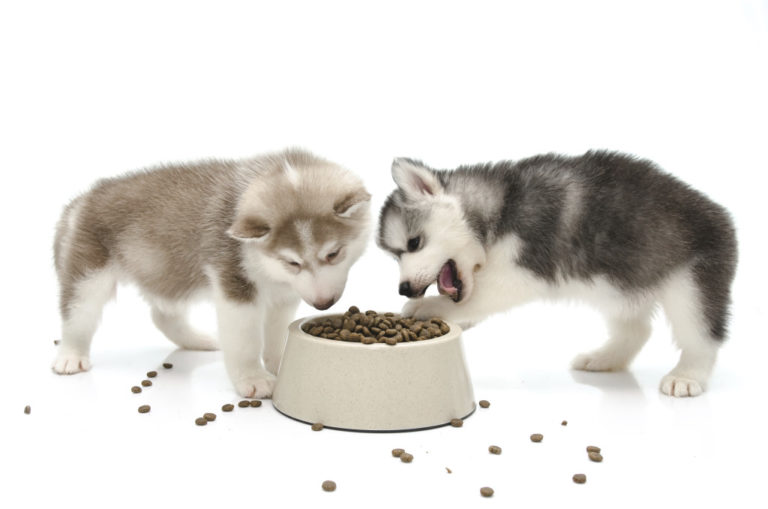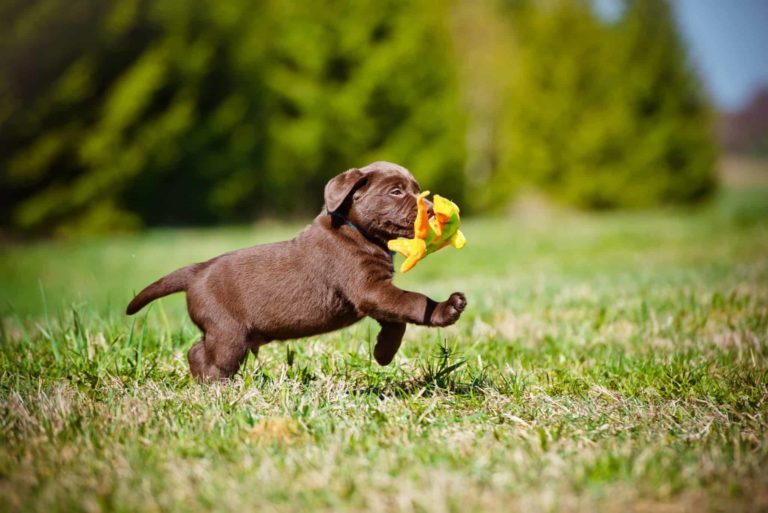How to Provide the Best Nutrition for Puppies and Kittens
Figuring out the right diet for your new pet can be overwhelming. With so many brands and types of pet food on the market, it can be difficult to determine which contain the best nutrition for puppies and kittens. Puppies and kittens have different nutritional needs than their adult counterparts, and require a strong foundation to help prevent future diseases and obesity.

Most puppies and kittens are weaned by the time they arrive in their new home at 7 to 9 weeks old. At this time, nutrition for puppies and kittens must be formulated to support the growth and development of a new pet. Plus, the nutrition needs will change over the course of the first year and when the puppy or kitten matures into a full grown dog or cat. Cats and small/medium sized dogs will reach maturity from approximately 9-10 months, while large and giant breeds of dog will reach full size and maturity between 18-24 months.
Questions about nutrition for puppies and kittens? Call the expert Richard veterinarians at Breckinridge Park Animal Hospital: (972) 690-6900
Choosing the right commercial food brand can be hard. Walk down the aisles of any supermarket or pet store and there are numerous bags lining the shelves. One place to help narrow down the choices is to look at the label for an AAFCO ( Association of Animal Feed Control Officials ) statement. This statement will provide information about the food, including the life-stage for which it is intended, and if any feeding trials have been done to prove the formulation meets dietary needs. Feeding trials show that the food is safe and nutritionally sound for the target population, and meets nutritional requirements recommended by the AAFCO.

Next, it is important to look at the dietary ingredients, and if the food has the right nutrition for puppies and kittens.
5 Dietary Ingredients Puppy and Kitten Food Should Include
1. Energy
Puppies and kittens grow the most between 3 and 6 months, and their energy needs during the first 4 months are about twice of those for mature animals. The amount of energy needed will decrease some after neutering, too. By working with your veterinarian, you can look at the pet’s body condition score (BCS) to determine the best caloric requirements for your puppy or kitten. By monitoring your pet’s caloric needs and intake, you make sure that they are getting the appropriate amount of fats for energy, while keeping them at a healthy weight to avoid later obesity.
2. Protein
Good nutrition for puppies and kittens includes protein. Protein provides amino acids and structures for growth. It also helps maintain a healthy immune system by supporting production of immunoglobulins and antibodies. Kittens require more protein than puppies, needed 11 essential amino acids, compared to 10 in puppies.
3. Calcium and Phosphorus
Commercial foods should have the appropriate ratios to help maintain healthy levels in your pet. If already in your puppy’s or kitten’s diet, additional supplementation is not required nor suggested, as too much of these nutrients is undesirable and may be harmful.
4. DHA
A good food with the appropriate nutrition for puppies and kittens will include this omega-3 fatty acid. It helps with retinal, neural and auditory development, affecting training and learning in puppies.
5. Antioxidants
Vitamins and minerals that support immunity growth in your puppy or kitten are essential to a heathy diet.
A quality, commercial food will provide healthy nutrition for puppies and kittens. But how often should you feed them?
Feeding Frequency
- For puppies, start with 2-4 feedings per day, depending on the size of your dog. Smaller breed puppies may need more frequent feedings than their larger breed friends for the first 3 months. After the puppy period, discuss feeding frequency with your veterinarian to determine the best schedule for your adult dog’s needs.
- For kittens, “free-choice” feeding is recommended until 5 months, then switching to 3-4 meals per day for an additional month. Kittens are then often switched to 2 meals per day through adulthood.
4 Tips on Nutrition for Puppies and Kittens
1. Transition
When changing foods, it is important to transition from one food the next gradually. Add a little bit of the new food each day, while reducing the amount of the old food over a 4-6 day period. This will help minimize digestive distress, and help your pet transition and accept the new food more easily.
2. Size/Stage
Be sure to purchase food that is appropriate for your pet’s size and stage of life. Most large breed puppies can transition to adult food at about 8-10 months, while smaller breeds may need a little longer on a puppy diet. Kittens are often able to transition to adult diets at about 9-10 months.
3. Label Tips
Read labels with an understanding of the terms. Some terms, such as “holistic”, have no legal definition and can be used by manufacturers at will. Other terms, such as “organic”, have a legal definition, but can still be used in ways to mislead the consumer. Further, “by-products” can be many different parts of an animal, but does not include non-edible parts.
4. Non-Commercial
If you choose to feed your pet a non-commercial diet, it is imperative to work with an expert in animal nutrition to ensure that your puppy or kitten is getting everything they need. Even though it is a trend to feed pets what they would eat in the wild (raw, etc.), it is important to understand that domestication has changed the lifespan of pets, and nutritional needs may be different than what was needed in the wild. Also, raw diets can increase the risk of bacteria in food.

Richardson veterinarians at Breckinridge Park Animal Hospital have the best advice about nutrition for puppies and kittens. By understanding the needs of growing puppies and kittens, you can give your new pet a healthy beginning. By providing a diet with the right amount of energy and nutrients, your puppy or kitten will grow strong. However, we cannot emphasize enough how important it is to discuss proper nutrition for puppies and kittens with a qualified veterinarian, like the experts at Breckinridge Park Animal Hospital. Proper nutrition and routine health evaluations will prolong the life of your new family member.
Contact Expert Richardson Veterinarians
Do you have a new puppy or kitten and want to ensure they are growing healthy and strong? Make an appointment with the Richardson veterinarians at Breckinridge Park Animal Hospital. We can answer all of your questions about nutrition for puppies and kittens, and provide the best veterinary care. Call (972) 690-6900 or click here to schedule an appointment. We can’t wait to meet you!
Breckinridge Park Animal Hospital serves the northeast Dallas suburban area. We provide the community with some of the best veterinarians for Richardson, Garland, Plano, Murphy, Wylie, Sachse and Mesquite.
This information is not a substitute for professional veterinary medical advice. Prior to starting any new treatment or questions regarding an animal’s medical condition, always seek the advice of your veterinarian.

